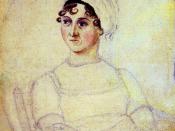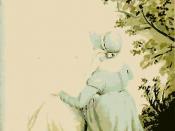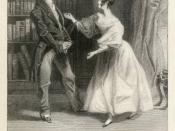Beneath the surface of the romantic comedy Pride and Prejudice, Jane Austen presents an underlying theme of the economic situation faced by women in the early nineteenth century. The best representations of this in the story is how two of the women in the novel approach marriage, and what they hope to achieve or gain through it.
The two girls mentioned above are Elizabeth and Charlotte. Elizabeth is one five sisters in a family with no male heir. Their father's estate is entailed in such a way that no one in their immediate family will receive it, so when their father dies all that they will have is the small amount of money that belongs to their mother. One of the problems that both of the girls, and the rest of the women in their society for that matter, faced was the fact that even the most educated woman could not support herself.
Unless you are very wealthy woman or had very wealthy parents then marriage seems to be the only way you can live a decent life. Most people of the day thought that marriage "was the only honorable provision for well-educated young women of small fortune." It became a source of financial security that in many cases went no further.
Elizabeth is the first woman in the story to be proposed to, and she did a very peculiar thing. She is proposed to by Mr. Collins, the very man who is going to inherit her father's estate. She refuses his offer even though his "situation in life...[his] connections....and [his] relationship to [Elizabeth], are circumstances highly in [his] favor." Elizabeth simply says that "[he] could never make [her]happy...and [she] is the last woman in the world that could make [him] so." What makes her decision so...


